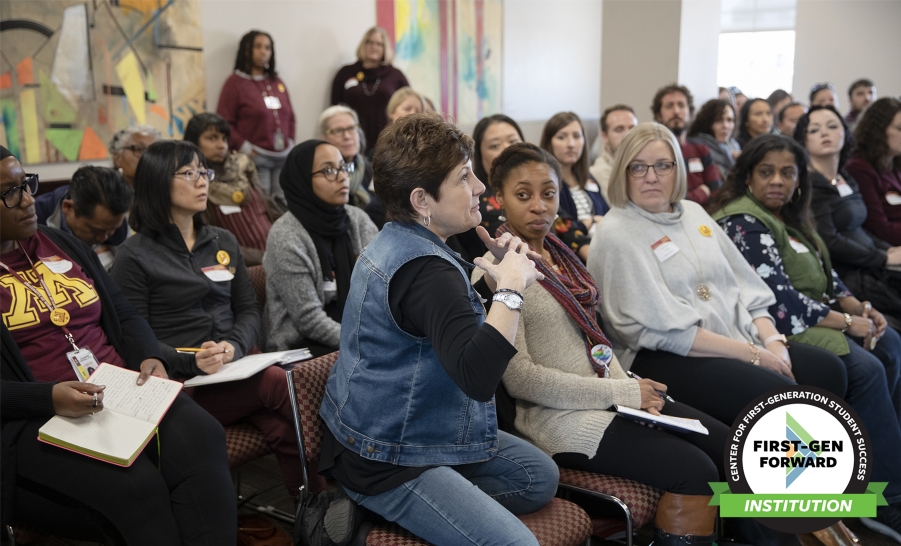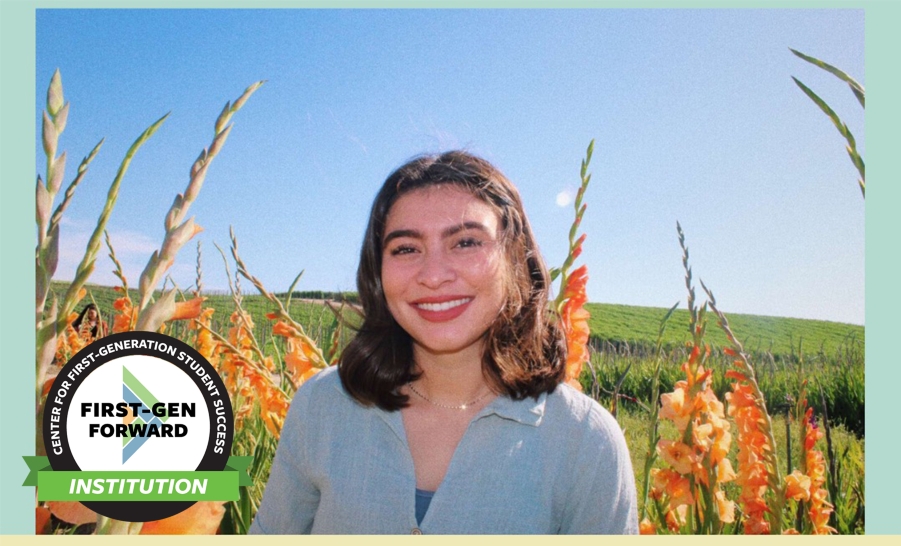Five Years of Moving #FirstgenForward
Sarah E. Whitley Ph.D., Center for First-Generation Student Success / FirstGen Forward / June 14, 2022
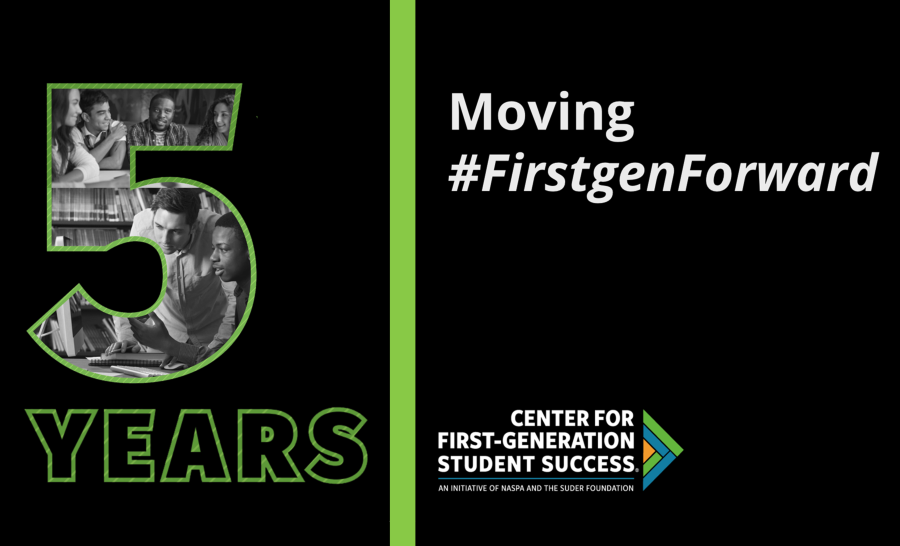
The Center for First-generation Student Success celebrates five years!
Five years. FIVE YEARS! Our world is a different place than when the Center launched in June 2017, but we know first-generation college students need intentional support more than ever. We are witnessing firsthand a national movement by institutions to serve this student population with intentionality. The community of leaders who understand the generational and societal impacts of advancing outcomes for first-generation students is what drives the Center’s daily commitment to this important work. In reflecting upon the last five years, I am reminded of the Center’s unique positionality as a resource to institutional leaders. There are many organizations promoting important access work to encourage college-going for first-generation students, but unless those students enter institutions that were created with them in mind, the ability to foster success is limited. Through our work, we are seeing an evolution from deficit-based thinking to asset-minded approaches and the emergence of innovative and entrepreneurial collaborations, evidence-informed decision-making, and a commitment to institutional strategic alignment that prioritizes first-generation students. It makes the work of the Center more important than ever.
The work of the Center provides important avenues for knowledge creation and dissemination, networking, and the sharing of important lessons broadly.
Soon after the Center opened, we worked in collaboration with our co-founders, Eric and Deb Suder, to draft an original set of strategic priorities. Our goals included building peer communities and recognizing outstanding work in the first-generation space, advancing both original and emerging scholarship, providing access to necessary data, convening thought leaders and policy makers to effect change, and launching a signature effort, First Scholars, that would allow institutions to sustain and scale first-generation supports in a way not yet seen. These priorities have driven our work over the last five years and will evolve to drive our future, too.
Innovation & Scalable Approaches
Create innovative programs, drive evidence-based solutions, and provide professional development opportunities designed to drive systemic, scalable impact in improving first-generation student success.

First Scholars Network institutions leverage an important blend of Expert Guidance and implementation science, along with intentional curriculum and diagnostic tools, to engage in a phased approach that centers both improvising institutional infrastructure and advancing holistic student supports.

The First Scholars model includes:
- Phase I formalizes institutional commitment to build a foundational understanding of first-generation student success through peer networking, shared knowledge and resources, and establishing community. Institutions successfully completing Phase I earn the First-gen Forward designation.
- First-gen Forward institutions earning the official designation have an opportunity to engage in annual networking and professional development that results in a triennial reaffirmation of designation. First-gen Forward institutions are also eligible to progress into First Scholars Phase II.
- Phase II focuses on establishing key approaches to advancing first-generation efforts, utilizing diagnostics to establish sustainable institutional infrastructure, and identifying data-informed goals in alignment with desired outcomes.
- Phase III supports institutions through implementing and scaling goals through continuous improvement and creating a reflexive environment for growth and innovation.
- Phase IV positions first-generation friendly institutions to elevate institutional successes via iterative continuous improvement and to network with other transformative institutions nationally.
Through First Scholars, institutions benefit from access to the National Student Clearinghouse’s Postsecondary Data Partnership (PDP), made possible by a grant from The Bill & Melinda Gates Foundation, to access comprehensive and comparative data across a broad host of metrics.
All of these activities broadly shift mindsets and actions about first-generation students while also establishing interest from a pipeline of IHEs who want to join the First Scholars Network.
Connect and Recognize
Build engaged communities across higher education that foster, recognize, and celebrate excellence in serving first-generation student success.
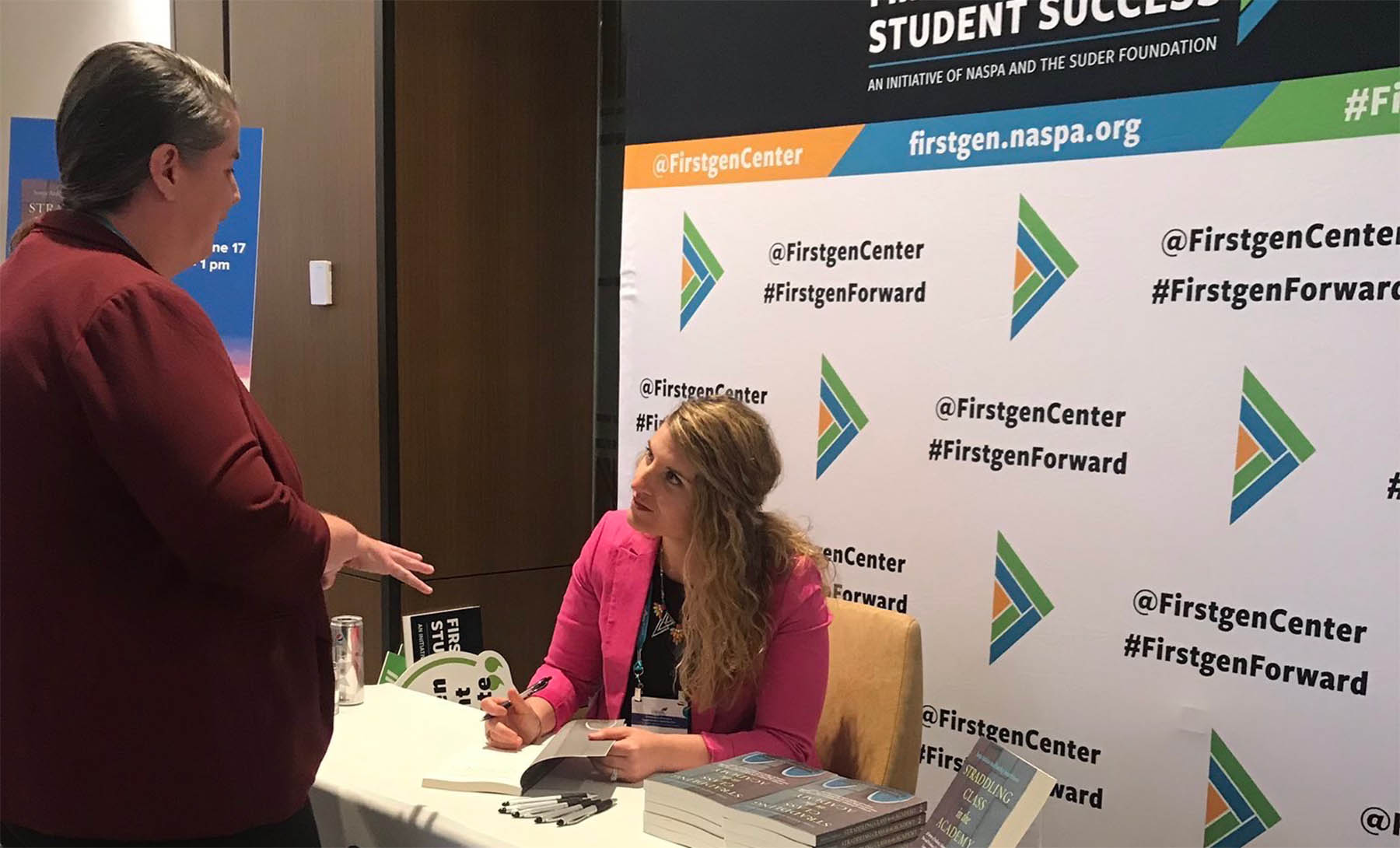
While virtual engagement is valuable, especially in recent years, being in-person with our colleagues is always a treat. We foster community through the NASPA Annual Conference and First-generation Student Success Conference as well as regional events and invited talks all throughout the year. These place-based and virtual events offer dedicated space to share scholarship and promising practices while opening insightful conversations critical to advancing the success of first-generation students. From June 26-29, we look forward to gathering with many of you in Baltimore, Maryland for the 2022 NASPA Conferences on Student Success in Higher Education.
Knowledge Creation & Evidence-based Practices
Develop and promote scholarly research and data-informed practice as the primary clearinghouse for post-secondary education to advance first-generation student persistence and completion.
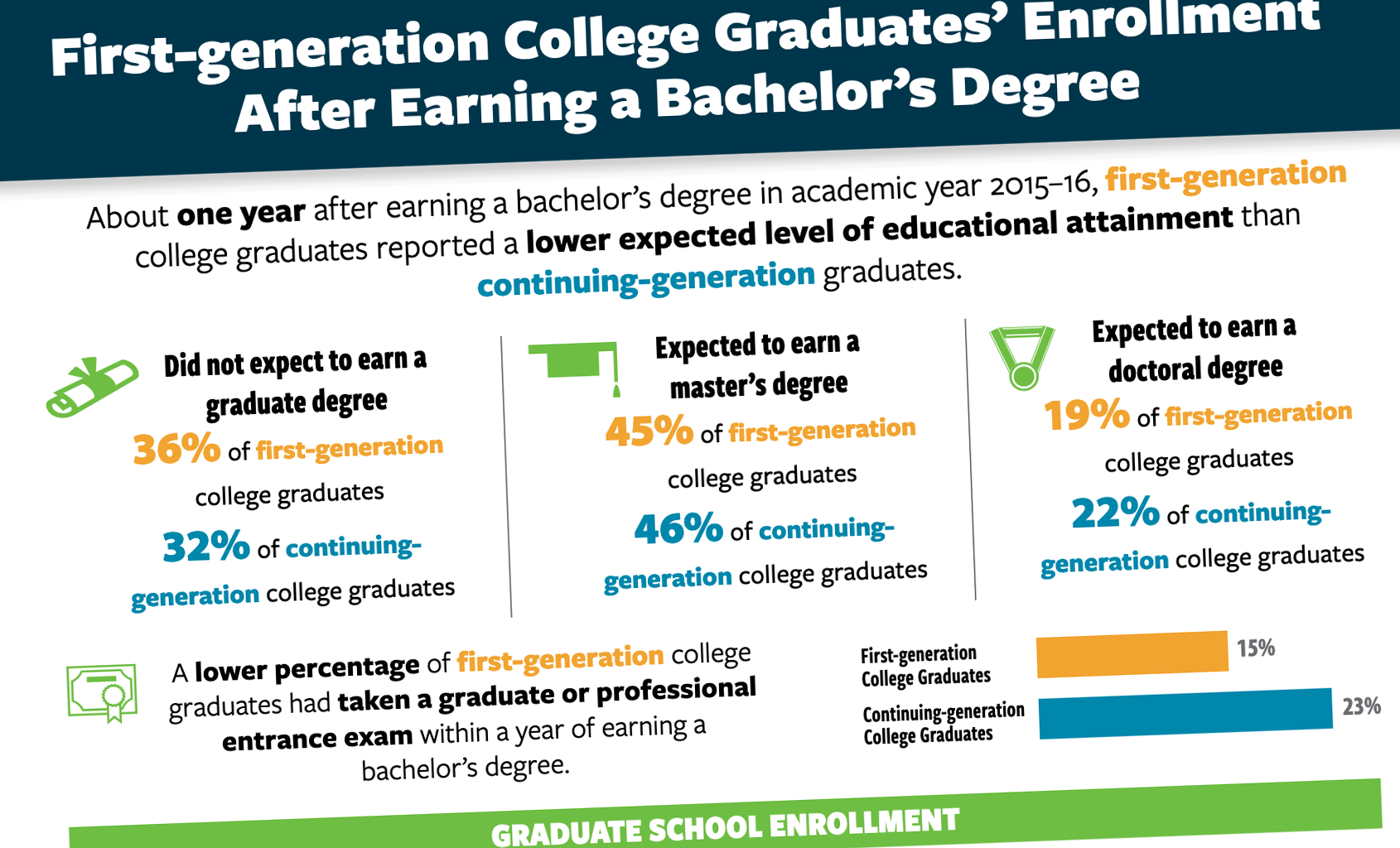
To foster data-informed decision-making and bridge gaps in knowledge, the Center released national data fact sheets on First-generation College Students and about First-generation College Graduates’ Transition To Graduate School And Career Preparation, made possible by a generous contribution from Crimsonbridge Foundation.
Examining how postsecondary institutions support first-generation students in transitioning from college to career is more vital than ever. The knowledge that we produce and share through this project will benefit first-generation students and those who serve them for years to come.
Recently, the Center published First-generation Professionals in Higher Education: Strategies for the World of Work, which seeks to understand the complexities related to the transition from college or professional school to the work world of higher education as well as An Annotated Bibliography on First-generation College Students: Research from 2008-2019. The Center is also home to the nation’s first academic, peer-reviewed publication on this population, the Journal of First-generation Student Success, which seeks to publish practice articles that are grounded in research and literature and, reciprocally, research articles that speak to practice.
Center Online Learning also features regular virtual learning opportunities that feature a breadth of both practice- and research-based topics intended to offer practitioners and scholars groundbreaking knowledge on important topics. Over 40 offerings are currently available on the Center’s website.
Thought Leadership & Advocacy
Be a catalyst and thought leader for advancing critical first-generation student success conversations through national convenings, advocacy, and policy influence.
In alignment with the NASPA Public Policy Agenda, the Center organizes its advocacy and policy work in three ways: raising awareness, engaging with public officials, and building partnerships. Since its inception, the Center made inroads in each of these areas to better serve the interests of first-generation students and has engaged with members of Congress and state and local leaders to advance efforts.
Through the monthly #AdvocateFirstgen blogs, we’ve urged leaders to:
-
identify public officials who are first-generation graduates;
-
encourage additional funds for emergency aid that benefit first-generation students;
-
reach out to the Department of Education to oppose reinstatement of pre-COVID FAFSA verification requirements;
-
celebrate local community colleges during #CommunityCollege month;
-
contact representatives to discuss funding for mental health needs for first-generation college students;
-
support expanding broadband access for first-generation students; and
-
keep apprised of state-level legislation concerning legacy admissions and college student mental health-related funding.
Central to shaping a national asset-based narrative is CatalystFIRST, the Center’s vetted community of national scholars and thought leaders equipped to lead keynotes, workshops, presentations, and other first-generation focused efforts. To date, the Center has provided professional speakers to over 80 events across the country.
Use November 8 to encourage your communities to understand the systemic barriers plaguing higher education and the supports necessary for this important and resilient population to continue thriving.
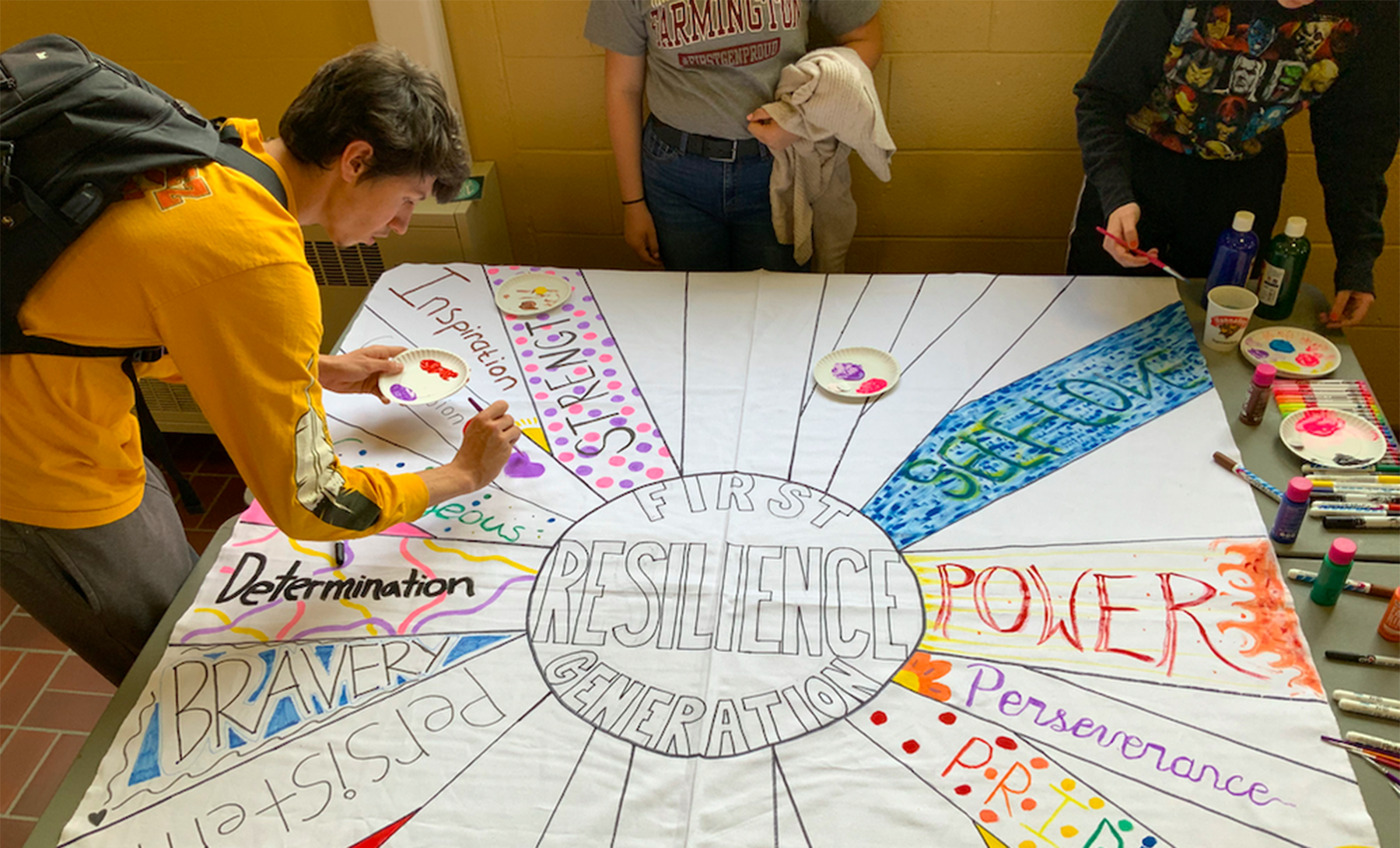
In 2021, a bipartisan team led by Senator Reverend Raphael Warnock (D-GA) and Senator Roger Marshall (R-KS) steered S. Res. 437 to passage under unanimous consent, helping solidify November 8 as a day to recognize the contributions and accomplishments of first-generation college students. To view the Senate resolution text and list of 19 bipartisan cosponsors, click here.
So, what’s next?
The Center has no plans to slow down our pace or lessen what we offer. In fact, we are growing rapidly and have big goals ahead that we will share more about the coming weeks. It is our mission to provide institutions with the tools and resources necessary to close equity gaps for first-generation students through sustained and scalable approaches, and we look forward to your continued partnership. The work of the Center and this milestone anniversary is made possible through the unwavering commitment of the #FirstgenForward community. We are excited for the next five years and many more beyond.

